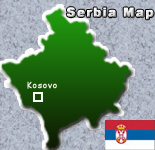Kosovo marks independence anniversary; Serbian opposition
 Pristina/Belgrade - Kosovo Albanians began celebrating the first year of independence Tuesday, while minority Serbs and Belgrade leaders vowed to continue challenging the secession.
Pristina/Belgrade - Kosovo Albanians began celebrating the first year of independence Tuesday, while minority Serbs and Belgrade leaders vowed to continue challenging the secession.
Prime Minister Hashim Thaci and President Fatmir Sejdiu addressed the parliament in Pristina at a solemn session and paid respect to prominent politicians and rebels who launched the fight against Serbian authority in the 1990s.
"On February 17, 2008, exactly one year ago, the representatives of the people of Kosovo have declared independence. It was an historic moment, after so much work, sacrifice and determination of a number of generations," said Sejdiu.
Thaci, in his remarks, said "Today is a day to celebrate all together with warmth, joy and solidarity. Today is the first anniversary of our proud, independent, sovereign and free country. Today is the birthday of all of us."
Kosovo Serb deputies boycotted the session, while Serb leaders convened the informal body representing their enclaves in Kosovo and again denounced the secession from Serbia.
"The province of Kosovo is, according to Serbia's constitution and UN resolution 1244, as well as UN Charter and Helsinki act, a part of undivided territory of sovereign state of Serbia," read a declaration of Serb enclaves adopted after the meeting in Zvecan, a town in the largest Serb enclave in northern Kosovo.
In a move which the authorities in Pristina condemned as a provocation, the Kosovo Serbs were joined by parliamentarians, mostly representatives of the opposition parties, traveling from Belgrade.
"Kosovo independence further elevated the tensions, especially of Serbs and other non-Albanians, because the respect of human rights, freedom of movement, right to return and the return of the properties are not moving in a direction Serbs and non-Albanians would like," Serb minister for Kosovo Goran Bogdanovic said.
The former province, which Serbia continues to consider as the cradle of its statehood, is dominated by a 90-per cent Albanian majority.
The Albanians launched an armed rebellion against Serbs in the late 1990s, giving up peaceful resistance to oppression by Serbian authorities.
Serbian security forces, then under the command of strongman Slobodan Milosevic, responded with a heavy hand a decade ago, flattening entire villages and causing a massive flight of the population to the neighbouring Albania and Macedonia.
NATO launched an aerial attack on the rump Yugoslavia in March 1999, ousting Serbian forces after 78 days of heavy bombing and paving the way for a United Nations protectorate.
Since then, all efforts to negotiate a solution between Belgrade and Pristina failed miserably.
Kosovo declared independence a year ago Tuesday and was recognized by 54 nations so far, including United States and 22 out of the 27 EU countries, but remained without a seat in the United Nations owing to opposition from Serbia's superpower ally Russia.
A year on, Kosovo is effectively partitioned along ethnic lines, with the Serbs thoroughly dominating the northern one-quarter of the territory and refusing to accept central rule.
The situation is complicated by Russia's blockade in the UN, which prevented the pullout of the old administration and its full replacement by an EU law-enforcing mission - so far, both missions continue to operate in the field.
On its part, Serbia endorses the resistance of its compatriots in Kosovo and financially backs them. Officials frequently repeat that they will never recognize what they describe as the "false state Kosovo."
Serbian Prime Minister Mirko Cvetkovic in a statement Tuesday said that Belgrade would "never recognize the illegal acts of provisional Kosovo Albanian authorities nor their intentions to create a virtual state on Serbia's territory."
Celebrations of Kosovo independence will conclude on Tuesday night with a philharmonic concert and a "mega concert" on Pristina's main square.
During the day, Pristina was decorated with flags from all the countries which have recognized Kosovo's independence. Many streets were blocked with huge lines of automobiles and people dancing and waving US, British, German and Kosovo flags. (dpa)